Unit 9: Entrepreneurship and Small Business Management (ESBM) Report
VerifiedAdded on 2023/01/10
|13
|3440
|94
Report
AI Summary
This report provides a comprehensive overview of entrepreneurship and small business management. It begins by examining different types of entrepreneurial ventures, such as small businesses, large businesses, and social businesses, and explains their relationship to the typology of entrepreneurship, including lifestyle, social, commercial, and female entrepreneurship. The report then explores the similarities and differences between these ventures. It further analyzes the impact of micro and small businesses on the economy using relevant data and statistics, highlighting their role in job creation and economic growth. The importance of small businesses and start-ups to the social economy is also discussed. The report also identifies the characteristic traits and skills of successful entrepreneurs, differentiating them from other business managers, and assesses how aspects of the entrepreneurial personality reflect entrepreneurial motivation and mindset. Finally, the report examines how background and experience can either hinder or foster entrepreneurship, providing a well-rounded analysis of the subject.
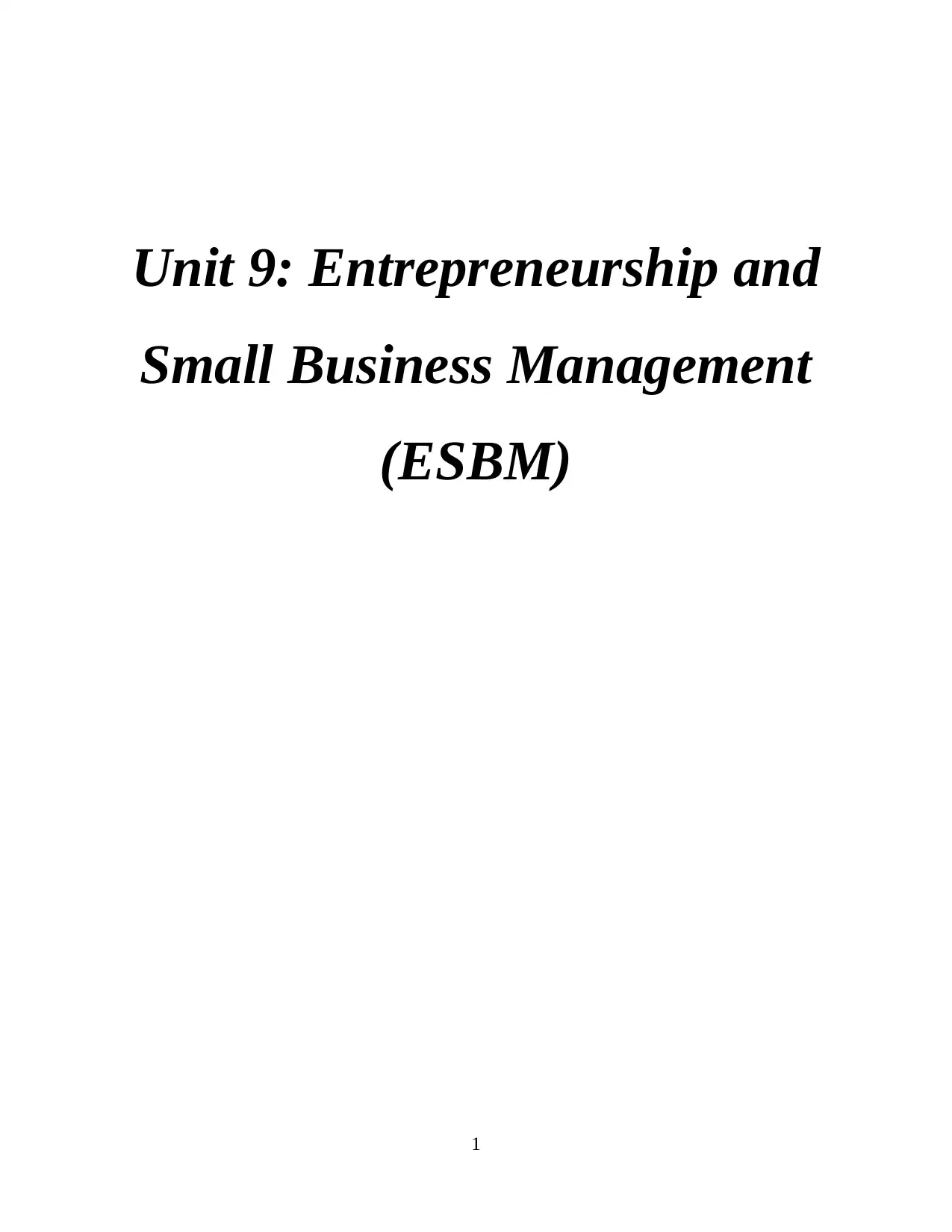
Unit 9: Entrepreneurship and
Small Business Management
(ESBM)
1
Small Business Management
(ESBM)
1
Paraphrase This Document
Need a fresh take? Get an instant paraphrase of this document with our AI Paraphraser
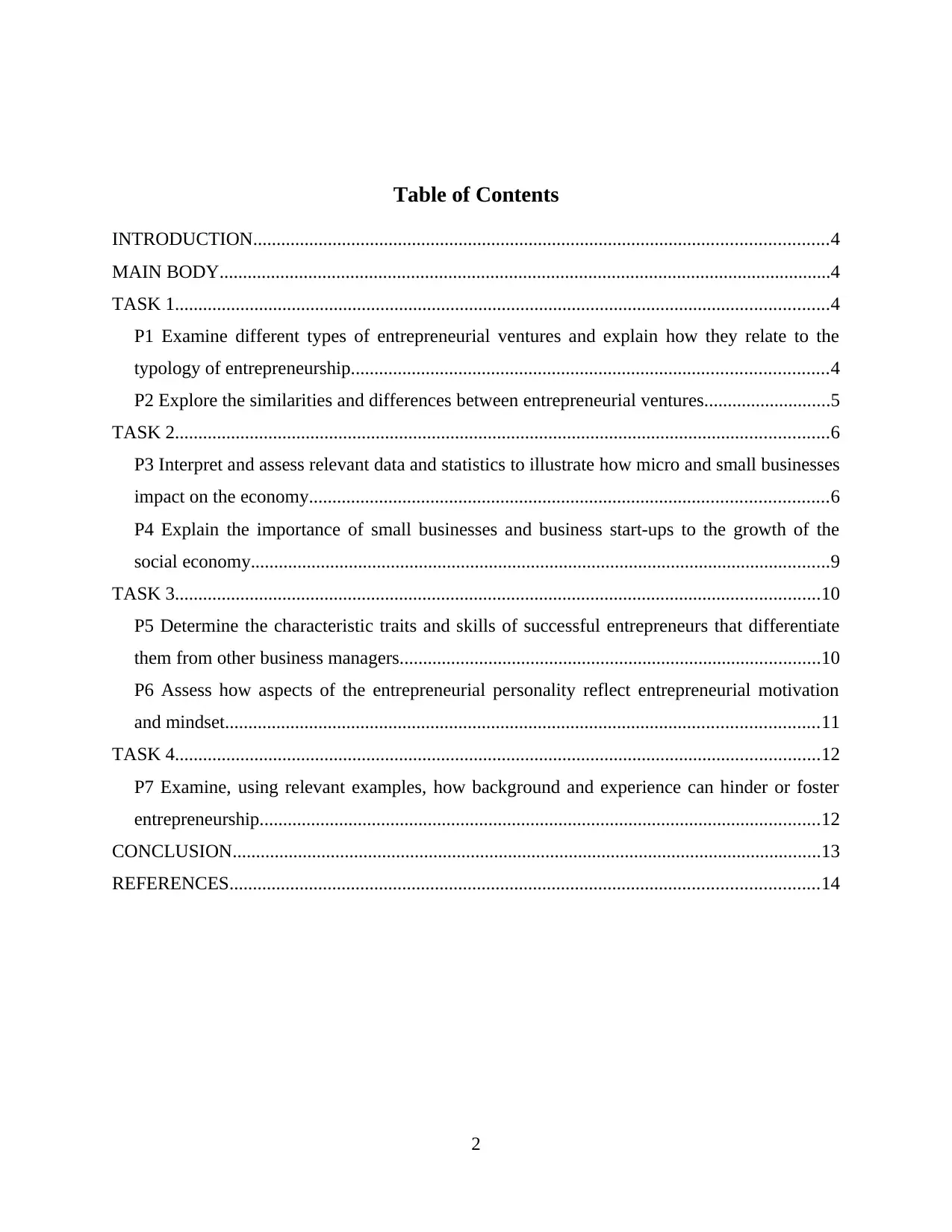
Table of Contents
INTRODUCTION...........................................................................................................................4
MAIN BODY...................................................................................................................................4
TASK 1............................................................................................................................................4
P1 Examine different types of entrepreneurial ventures and explain how they relate to the
typology of entrepreneurship......................................................................................................4
P2 Explore the similarities and differences between entrepreneurial ventures...........................5
TASK 2............................................................................................................................................6
P3 Interpret and assess relevant data and statistics to illustrate how micro and small businesses
impact on the economy...............................................................................................................6
P4 Explain the importance of small businesses and business start-ups to the growth of the
social economy............................................................................................................................9
TASK 3..........................................................................................................................................10
P5 Determine the characteristic traits and skills of successful entrepreneurs that differentiate
them from other business managers..........................................................................................10
P6 Assess how aspects of the entrepreneurial personality reflect entrepreneurial motivation
and mindset...............................................................................................................................11
TASK 4..........................................................................................................................................12
P7 Examine, using relevant examples, how background and experience can hinder or foster
entrepreneurship........................................................................................................................12
CONCLUSION..............................................................................................................................13
REFERENCES..............................................................................................................................14
2
INTRODUCTION...........................................................................................................................4
MAIN BODY...................................................................................................................................4
TASK 1............................................................................................................................................4
P1 Examine different types of entrepreneurial ventures and explain how they relate to the
typology of entrepreneurship......................................................................................................4
P2 Explore the similarities and differences between entrepreneurial ventures...........................5
TASK 2............................................................................................................................................6
P3 Interpret and assess relevant data and statistics to illustrate how micro and small businesses
impact on the economy...............................................................................................................6
P4 Explain the importance of small businesses and business start-ups to the growth of the
social economy............................................................................................................................9
TASK 3..........................................................................................................................................10
P5 Determine the characteristic traits and skills of successful entrepreneurs that differentiate
them from other business managers..........................................................................................10
P6 Assess how aspects of the entrepreneurial personality reflect entrepreneurial motivation
and mindset...............................................................................................................................11
TASK 4..........................................................................................................................................12
P7 Examine, using relevant examples, how background and experience can hinder or foster
entrepreneurship........................................................................................................................12
CONCLUSION..............................................................................................................................13
REFERENCES..............................................................................................................................14
2

3
⊘ This is a preview!⊘
Do you want full access?
Subscribe today to unlock all pages.

Trusted by 1+ million students worldwide
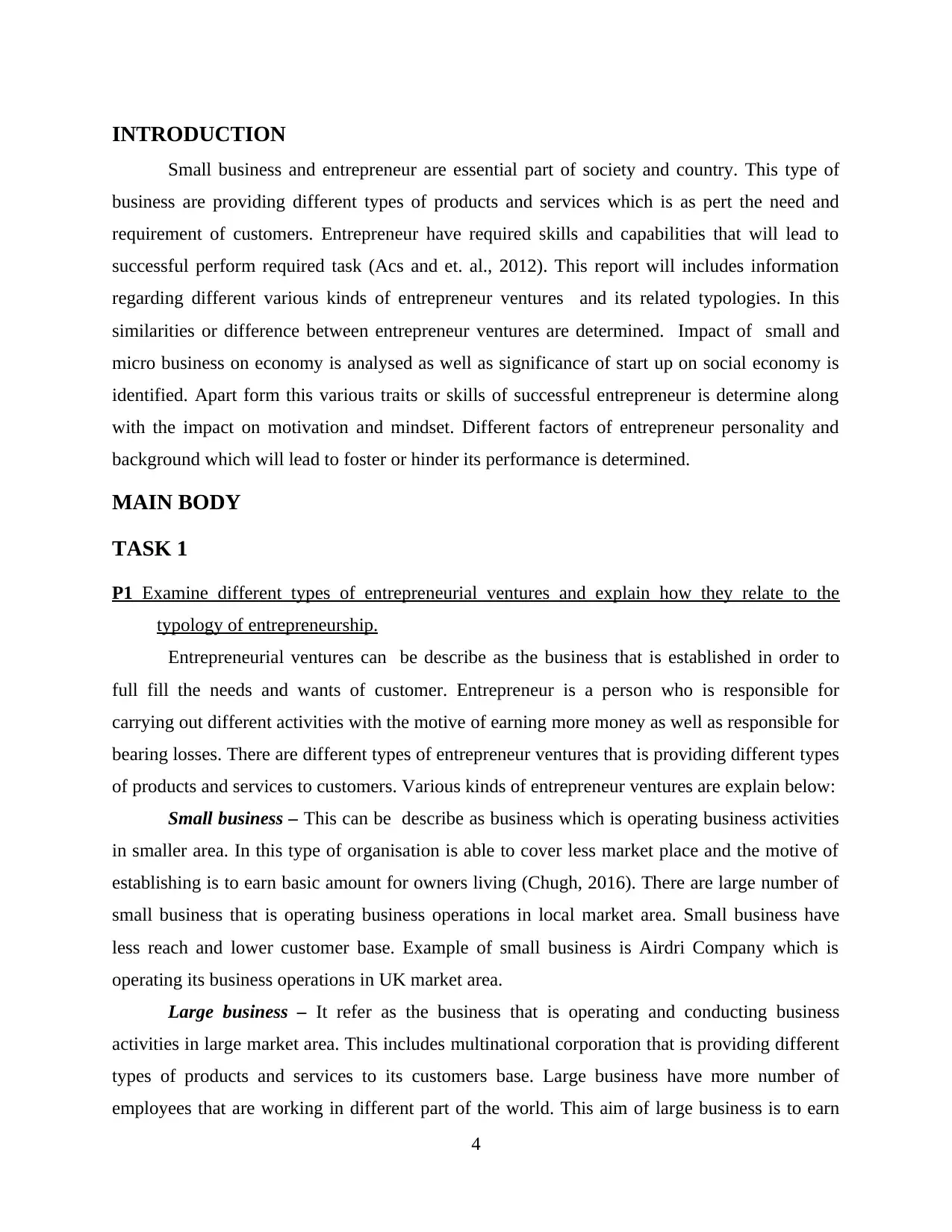
INTRODUCTION
Small business and entrepreneur are essential part of society and country. This type of
business are providing different types of products and services which is as pert the need and
requirement of customers. Entrepreneur have required skills and capabilities that will lead to
successful perform required task (Acs and et. al., 2012). This report will includes information
regarding different various kinds of entrepreneur ventures and its related typologies. In this
similarities or difference between entrepreneur ventures are determined. Impact of small and
micro business on economy is analysed as well as significance of start up on social economy is
identified. Apart form this various traits or skills of successful entrepreneur is determine along
with the impact on motivation and mindset. Different factors of entrepreneur personality and
background which will lead to foster or hinder its performance is determined.
MAIN BODY
TASK 1
P1 Examine different types of entrepreneurial ventures and explain how they relate to the
typology of entrepreneurship.
Entrepreneurial ventures can be describe as the business that is established in order to
full fill the needs and wants of customer. Entrepreneur is a person who is responsible for
carrying out different activities with the motive of earning more money as well as responsible for
bearing losses. There are different types of entrepreneur ventures that is providing different types
of products and services to customers. Various kinds of entrepreneur ventures are explain below:
Small business – This can be describe as business which is operating business activities
in smaller area. In this type of organisation is able to cover less market place and the motive of
establishing is to earn basic amount for owners living (Chugh, 2016). There are large number of
small business that is operating business operations in local market area. Small business have
less reach and lower customer base. Example of small business is Airdri Company which is
operating its business operations in UK market area.
Large business – It refer as the business that is operating and conducting business
activities in large market area. This includes multinational corporation that is providing different
types of products and services to its customers base. Large business have more number of
employees that are working in different part of the world. This aim of large business is to earn
4
Small business and entrepreneur are essential part of society and country. This type of
business are providing different types of products and services which is as pert the need and
requirement of customers. Entrepreneur have required skills and capabilities that will lead to
successful perform required task (Acs and et. al., 2012). This report will includes information
regarding different various kinds of entrepreneur ventures and its related typologies. In this
similarities or difference between entrepreneur ventures are determined. Impact of small and
micro business on economy is analysed as well as significance of start up on social economy is
identified. Apart form this various traits or skills of successful entrepreneur is determine along
with the impact on motivation and mindset. Different factors of entrepreneur personality and
background which will lead to foster or hinder its performance is determined.
MAIN BODY
TASK 1
P1 Examine different types of entrepreneurial ventures and explain how they relate to the
typology of entrepreneurship.
Entrepreneurial ventures can be describe as the business that is established in order to
full fill the needs and wants of customer. Entrepreneur is a person who is responsible for
carrying out different activities with the motive of earning more money as well as responsible for
bearing losses. There are different types of entrepreneur ventures that is providing different types
of products and services to customers. Various kinds of entrepreneur ventures are explain below:
Small business – This can be describe as business which is operating business activities
in smaller area. In this type of organisation is able to cover less market place and the motive of
establishing is to earn basic amount for owners living (Chugh, 2016). There are large number of
small business that is operating business operations in local market area. Small business have
less reach and lower customer base. Example of small business is Airdri Company which is
operating its business operations in UK market area.
Large business – It refer as the business that is operating and conducting business
activities in large market area. This includes multinational corporation that is providing different
types of products and services to its customers base. Large business have more number of
employees that are working in different part of the world. This aim of large business is to earn
4
Paraphrase This Document
Need a fresh take? Get an instant paraphrase of this document with our AI Paraphraser
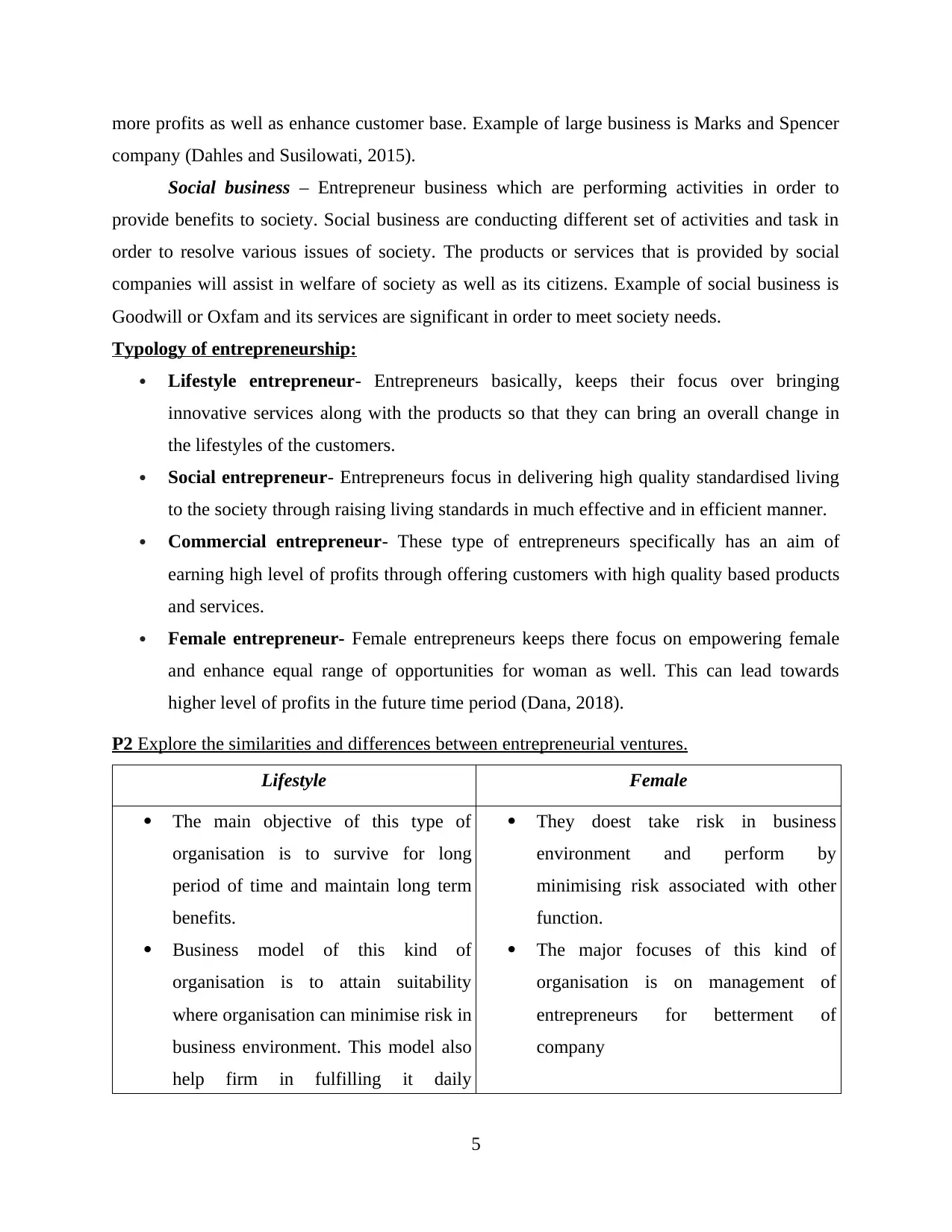
more profits as well as enhance customer base. Example of large business is Marks and Spencer
company (Dahles and Susilowati, 2015).
Social business – Entrepreneur business which are performing activities in order to
provide benefits to society. Social business are conducting different set of activities and task in
order to resolve various issues of society. The products or services that is provided by social
companies will assist in welfare of society as well as its citizens. Example of social business is
Goodwill or Oxfam and its services are significant in order to meet society needs.
Typology of entrepreneurship:
Lifestyle entrepreneur- Entrepreneurs basically, keeps their focus over bringing
innovative services along with the products so that they can bring an overall change in
the lifestyles of the customers.
Social entrepreneur- Entrepreneurs focus in delivering high quality standardised living
to the society through raising living standards in much effective and in efficient manner.
Commercial entrepreneur- These type of entrepreneurs specifically has an aim of
earning high level of profits through offering customers with high quality based products
and services.
Female entrepreneur- Female entrepreneurs keeps there focus on empowering female
and enhance equal range of opportunities for woman as well. This can lead towards
higher level of profits in the future time period (Dana, 2018).
P2 Explore the similarities and differences between entrepreneurial ventures.
Lifestyle Female
The main objective of this type of
organisation is to survive for long
period of time and maintain long term
benefits.
Business model of this kind of
organisation is to attain suitability
where organisation can minimise risk in
business environment. This model also
help firm in fulfilling it daily
They doest take risk in business
environment and perform by
minimising risk associated with other
function.
The major focuses of this kind of
organisation is on management of
entrepreneurs for betterment of
company
5
company (Dahles and Susilowati, 2015).
Social business – Entrepreneur business which are performing activities in order to
provide benefits to society. Social business are conducting different set of activities and task in
order to resolve various issues of society. The products or services that is provided by social
companies will assist in welfare of society as well as its citizens. Example of social business is
Goodwill or Oxfam and its services are significant in order to meet society needs.
Typology of entrepreneurship:
Lifestyle entrepreneur- Entrepreneurs basically, keeps their focus over bringing
innovative services along with the products so that they can bring an overall change in
the lifestyles of the customers.
Social entrepreneur- Entrepreneurs focus in delivering high quality standardised living
to the society through raising living standards in much effective and in efficient manner.
Commercial entrepreneur- These type of entrepreneurs specifically has an aim of
earning high level of profits through offering customers with high quality based products
and services.
Female entrepreneur- Female entrepreneurs keeps there focus on empowering female
and enhance equal range of opportunities for woman as well. This can lead towards
higher level of profits in the future time period (Dana, 2018).
P2 Explore the similarities and differences between entrepreneurial ventures.
Lifestyle Female
The main objective of this type of
organisation is to survive for long
period of time and maintain long term
benefits.
Business model of this kind of
organisation is to attain suitability
where organisation can minimise risk in
business environment. This model also
help firm in fulfilling it daily
They doest take risk in business
environment and perform by
minimising risk associated with other
function.
The major focuses of this kind of
organisation is on management of
entrepreneurs for betterment of
company
5
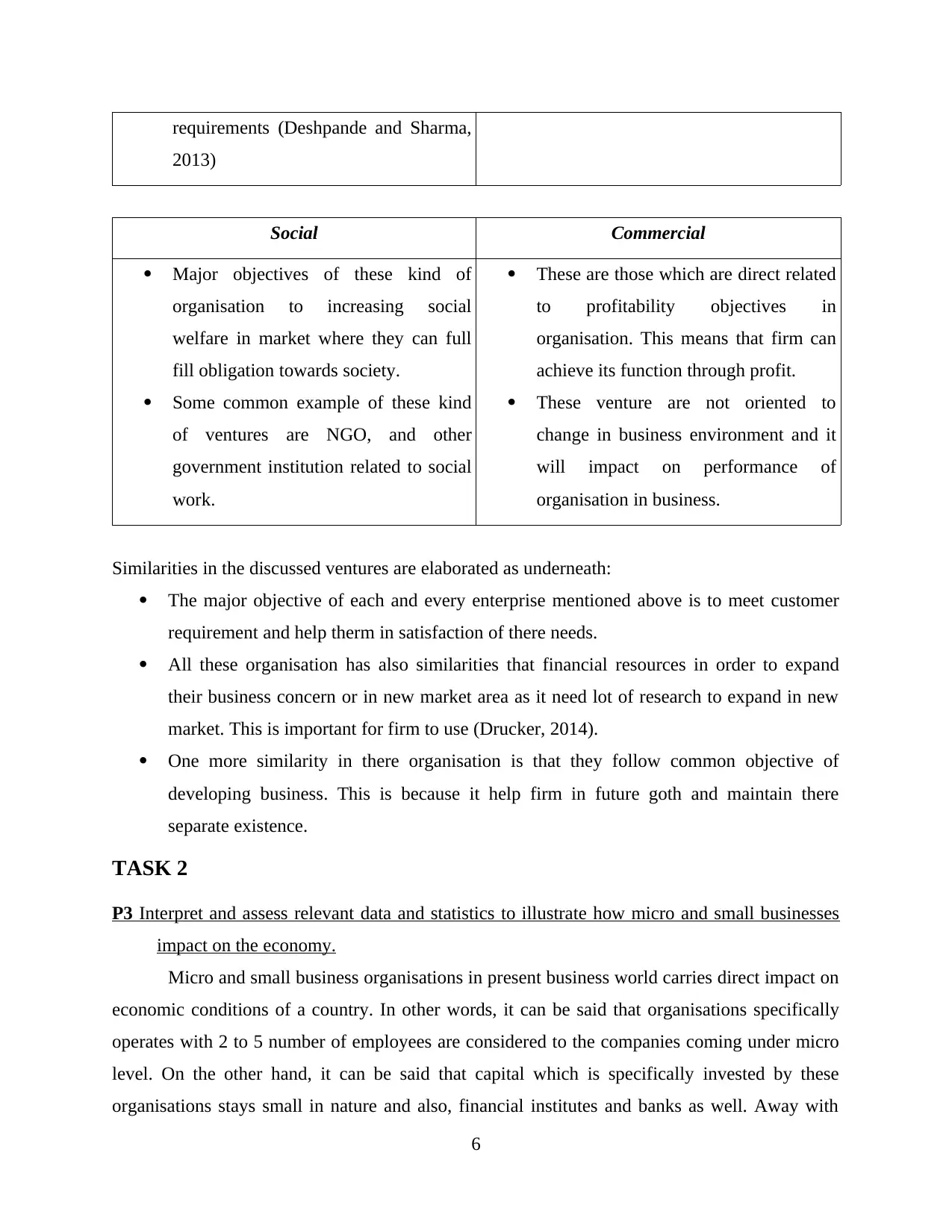
requirements (Deshpande and Sharma,
2013)
Social Commercial
Major objectives of these kind of
organisation to increasing social
welfare in market where they can full
fill obligation towards society.
Some common example of these kind
of ventures are NGO, and other
government institution related to social
work.
These are those which are direct related
to profitability objectives in
organisation. This means that firm can
achieve its function through profit.
These venture are not oriented to
change in business environment and it
will impact on performance of
organisation in business.
Similarities in the discussed ventures are elaborated as underneath:
The major objective of each and every enterprise mentioned above is to meet customer
requirement and help therm in satisfaction of there needs.
All these organisation has also similarities that financial resources in order to expand
their business concern or in new market area as it need lot of research to expand in new
market. This is important for firm to use (Drucker, 2014).
One more similarity in there organisation is that they follow common objective of
developing business. This is because it help firm in future goth and maintain there
separate existence.
TASK 2
P3 Interpret and assess relevant data and statistics to illustrate how micro and small businesses
impact on the economy.
Micro and small business organisations in present business world carries direct impact on
economic conditions of a country. In other words, it can be said that organisations specifically
operates with 2 to 5 number of employees are considered to the companies coming under micro
level. On the other hand, it can be said that capital which is specifically invested by these
organisations stays small in nature and also, financial institutes and banks as well. Away with
6
2013)
Social Commercial
Major objectives of these kind of
organisation to increasing social
welfare in market where they can full
fill obligation towards society.
Some common example of these kind
of ventures are NGO, and other
government institution related to social
work.
These are those which are direct related
to profitability objectives in
organisation. This means that firm can
achieve its function through profit.
These venture are not oriented to
change in business environment and it
will impact on performance of
organisation in business.
Similarities in the discussed ventures are elaborated as underneath:
The major objective of each and every enterprise mentioned above is to meet customer
requirement and help therm in satisfaction of there needs.
All these organisation has also similarities that financial resources in order to expand
their business concern or in new market area as it need lot of research to expand in new
market. This is important for firm to use (Drucker, 2014).
One more similarity in there organisation is that they follow common objective of
developing business. This is because it help firm in future goth and maintain there
separate existence.
TASK 2
P3 Interpret and assess relevant data and statistics to illustrate how micro and small businesses
impact on the economy.
Micro and small business organisations in present business world carries direct impact on
economic conditions of a country. In other words, it can be said that organisations specifically
operates with 2 to 5 number of employees are considered to the companies coming under micro
level. On the other hand, it can be said that capital which is specifically invested by these
organisations stays small in nature and also, financial institutes and banks as well. Away with
6
⊘ This is a preview!⊘
Do you want full access?
Subscribe today to unlock all pages.

Trusted by 1+ million students worldwide
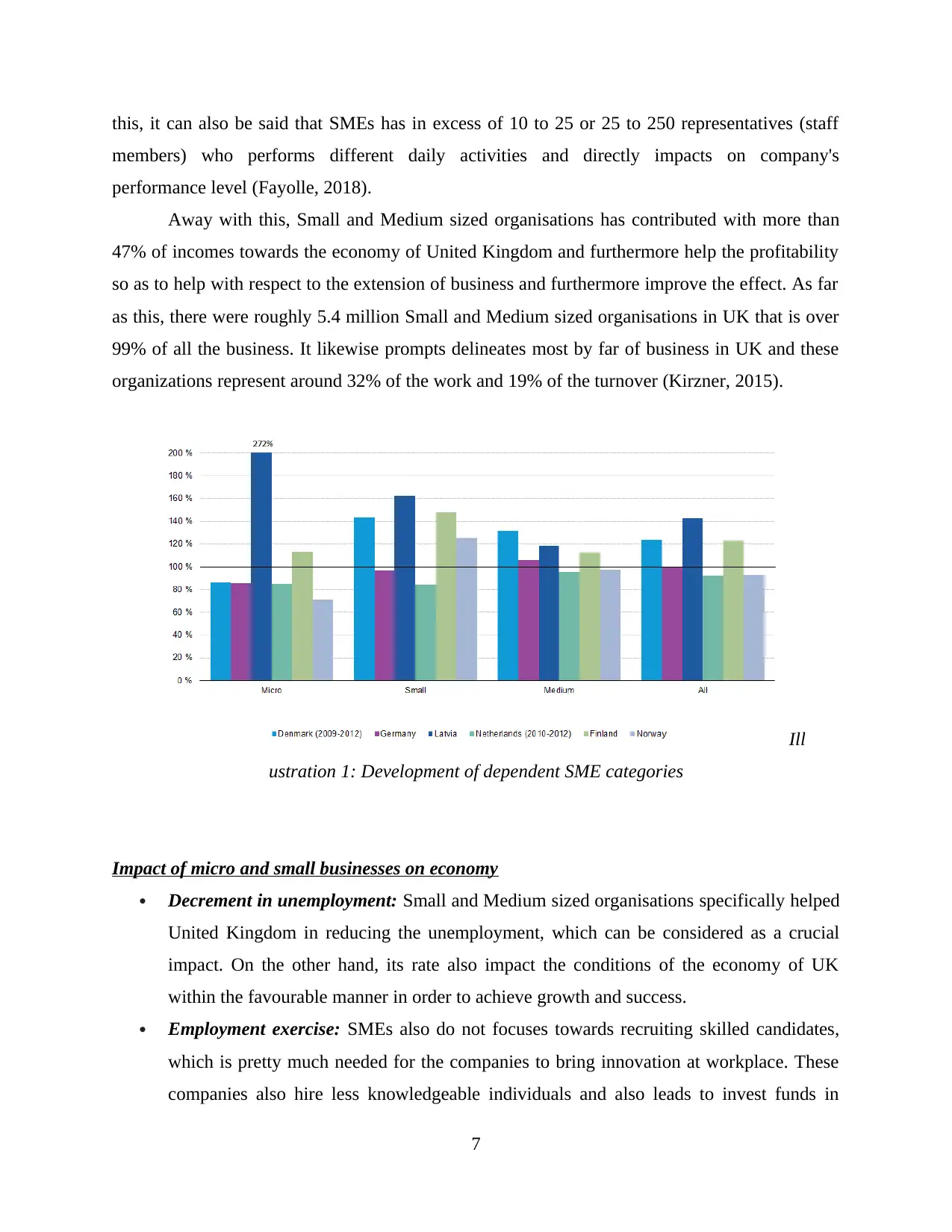
this, it can also be said that SMEs has in excess of 10 to 25 or 25 to 250 representatives (staff
members) who performs different daily activities and directly impacts on company's
performance level (Fayolle, 2018).
Away with this, Small and Medium sized organisations has contributed with more than
47% of incomes towards the economy of United Kingdom and furthermore help the profitability
so as to help with respect to the extension of business and furthermore improve the effect. As far
as this, there were roughly 5.4 million Small and Medium sized organisations in UK that is over
99% of all the business. It likewise prompts delineates most by far of business in UK and these
organizations represent around 32% of the work and 19% of the turnover (Kirzner, 2015).
Impact of micro and small businesses on economy
Decrement in unemployment: Small and Medium sized organisations specifically helped
United Kingdom in reducing the unemployment, which can be considered as a crucial
impact. On the other hand, its rate also impact the conditions of the economy of UK
within the favourable manner in order to achieve growth and success.
Employment exercise: SMEs also do not focuses towards recruiting skilled candidates,
which is pretty much needed for the companies to bring innovation at workplace. These
companies also hire less knowledgeable individuals and also leads to invest funds in
7
Ill
ustration 1: Development of dependent SME categories
members) who performs different daily activities and directly impacts on company's
performance level (Fayolle, 2018).
Away with this, Small and Medium sized organisations has contributed with more than
47% of incomes towards the economy of United Kingdom and furthermore help the profitability
so as to help with respect to the extension of business and furthermore improve the effect. As far
as this, there were roughly 5.4 million Small and Medium sized organisations in UK that is over
99% of all the business. It likewise prompts delineates most by far of business in UK and these
organizations represent around 32% of the work and 19% of the turnover (Kirzner, 2015).
Impact of micro and small businesses on economy
Decrement in unemployment: Small and Medium sized organisations specifically helped
United Kingdom in reducing the unemployment, which can be considered as a crucial
impact. On the other hand, its rate also impact the conditions of the economy of UK
within the favourable manner in order to achieve growth and success.
Employment exercise: SMEs also do not focuses towards recruiting skilled candidates,
which is pretty much needed for the companies to bring innovation at workplace. These
companies also hire less knowledgeable individuals and also leads to invest funds in
7
Ill
ustration 1: Development of dependent SME categories
Paraphrase This Document
Need a fresh take? Get an instant paraphrase of this document with our AI Paraphraser
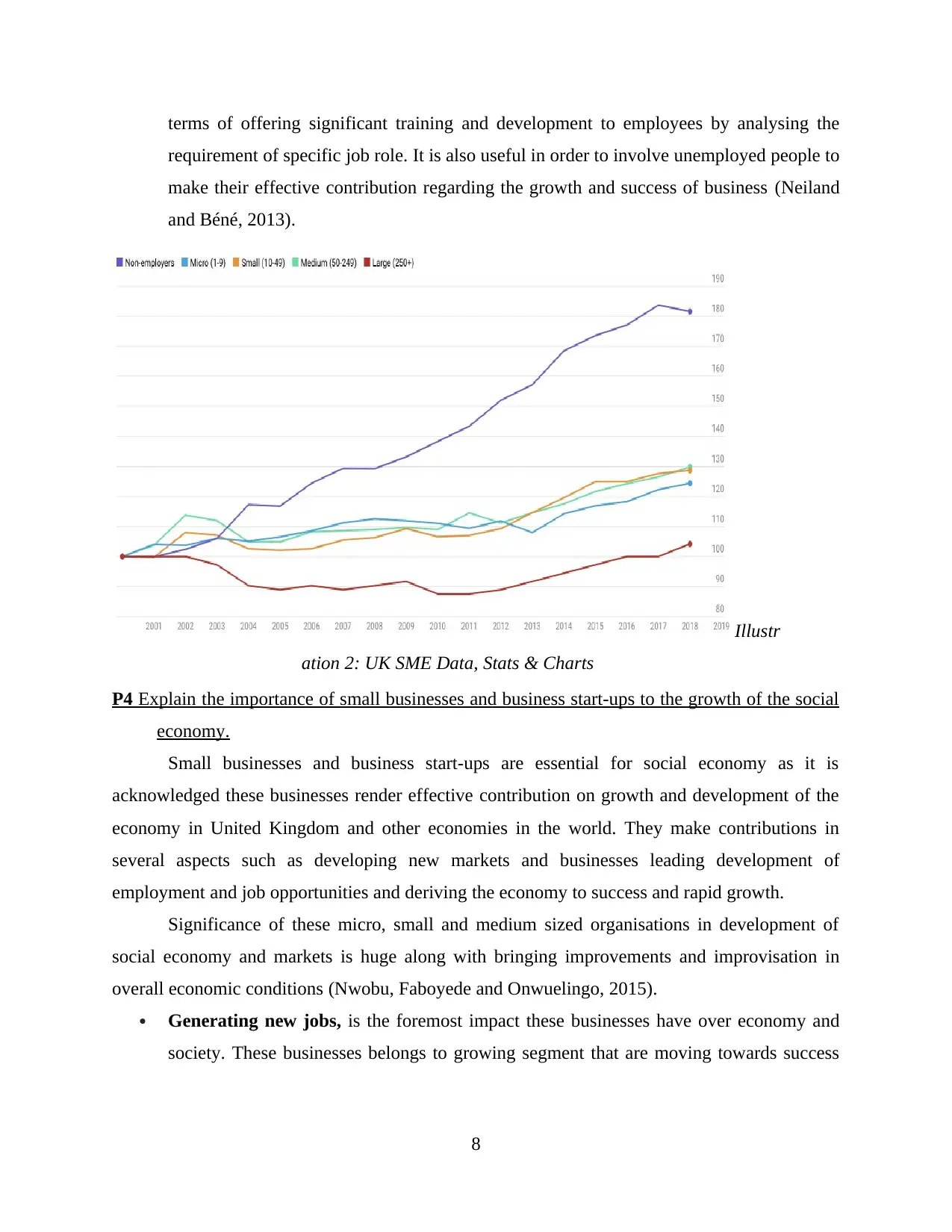
terms of offering significant training and development to employees by analysing the
requirement of specific job role. It is also useful in order to involve unemployed people to
make their effective contribution regarding the growth and success of business (Neiland
and Béné, 2013).
Illustr
ation 2: UK SME Data, Stats & Charts
P4 Explain the importance of small businesses and business start-ups to the growth of the social
economy.
Small businesses and business start-ups are essential for social economy as it is
acknowledged these businesses render effective contribution on growth and development of the
economy in United Kingdom and other economies in the world. They make contributions in
several aspects such as developing new markets and businesses leading development of
employment and job opportunities and deriving the economy to success and rapid growth.
Significance of these micro, small and medium sized organisations in development of
social economy and markets is huge along with bringing improvements and improvisation in
overall economic conditions (Nwobu, Faboyede and Onwuelingo, 2015).
Generating new jobs, is the foremost impact these businesses have over economy and
society. These businesses belongs to growing segment that are moving towards success
8
requirement of specific job role. It is also useful in order to involve unemployed people to
make their effective contribution regarding the growth and success of business (Neiland
and Béné, 2013).
Illustr
ation 2: UK SME Data, Stats & Charts
P4 Explain the importance of small businesses and business start-ups to the growth of the social
economy.
Small businesses and business start-ups are essential for social economy as it is
acknowledged these businesses render effective contribution on growth and development of the
economy in United Kingdom and other economies in the world. They make contributions in
several aspects such as developing new markets and businesses leading development of
employment and job opportunities and deriving the economy to success and rapid growth.
Significance of these micro, small and medium sized organisations in development of
social economy and markets is huge along with bringing improvements and improvisation in
overall economic conditions (Nwobu, Faboyede and Onwuelingo, 2015).
Generating new jobs, is the foremost impact these businesses have over economy and
society. These businesses belongs to growing segment that are moving towards success
8
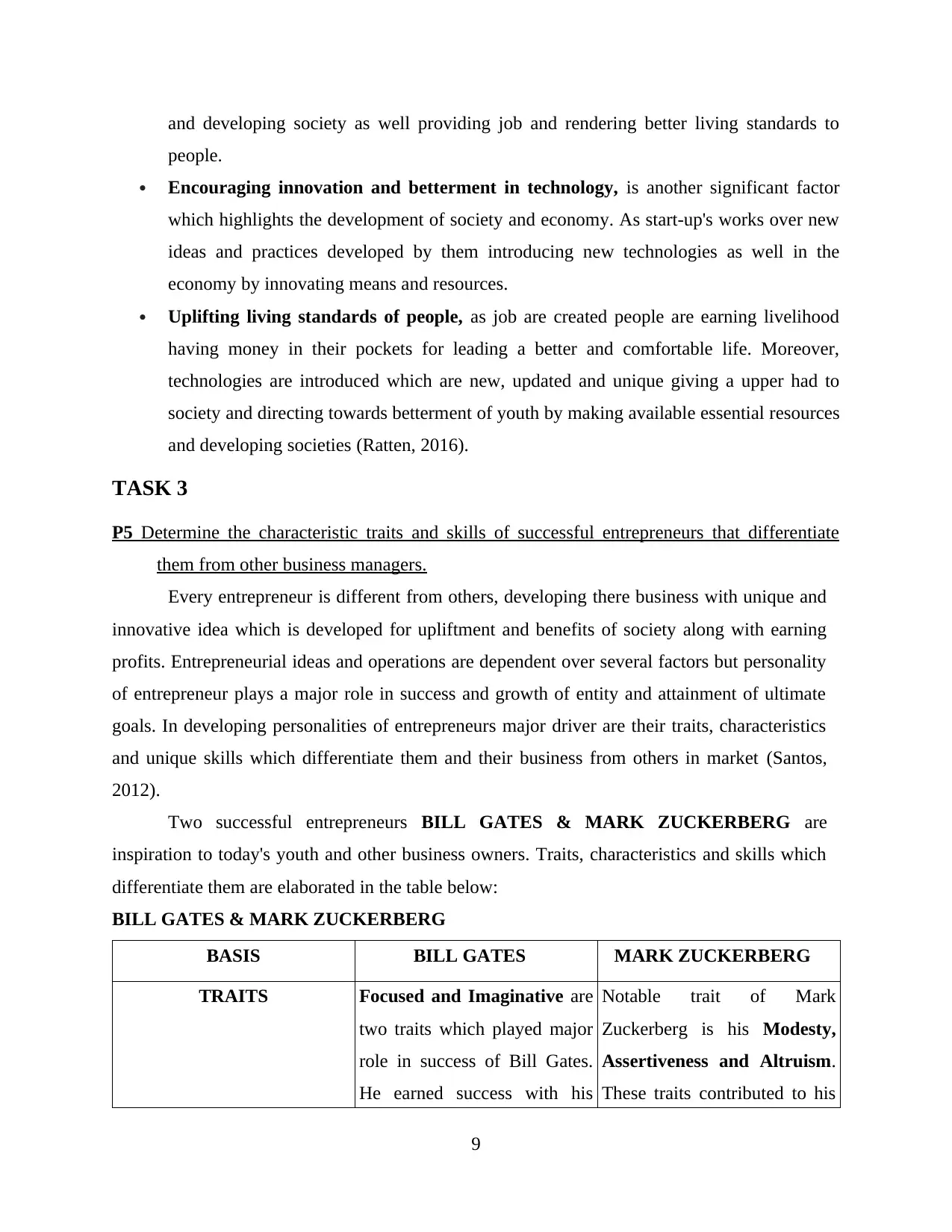
and developing society as well providing job and rendering better living standards to
people.
Encouraging innovation and betterment in technology, is another significant factor
which highlights the development of society and economy. As start-up's works over new
ideas and practices developed by them introducing new technologies as well in the
economy by innovating means and resources.
Uplifting living standards of people, as job are created people are earning livelihood
having money in their pockets for leading a better and comfortable life. Moreover,
technologies are introduced which are new, updated and unique giving a upper had to
society and directing towards betterment of youth by making available essential resources
and developing societies (Ratten, 2016).
TASK 3
P5 Determine the characteristic traits and skills of successful entrepreneurs that differentiate
them from other business managers.
Every entrepreneur is different from others, developing there business with unique and
innovative idea which is developed for upliftment and benefits of society along with earning
profits. Entrepreneurial ideas and operations are dependent over several factors but personality
of entrepreneur plays a major role in success and growth of entity and attainment of ultimate
goals. In developing personalities of entrepreneurs major driver are their traits, characteristics
and unique skills which differentiate them and their business from others in market (Santos,
2012).
Two successful entrepreneurs BILL GATES & MARK ZUCKERBERG are
inspiration to today's youth and other business owners. Traits, characteristics and skills which
differentiate them are elaborated in the table below:
BILL GATES & MARK ZUCKERBERG
BASIS BILL GATES MARK ZUCKERBERG
TRAITS Focused and Imaginative are
two traits which played major
role in success of Bill Gates.
He earned success with his
Notable trait of Mark
Zuckerberg is his Modesty,
Assertiveness and Altruism.
These traits contributed to his
9
people.
Encouraging innovation and betterment in technology, is another significant factor
which highlights the development of society and economy. As start-up's works over new
ideas and practices developed by them introducing new technologies as well in the
economy by innovating means and resources.
Uplifting living standards of people, as job are created people are earning livelihood
having money in their pockets for leading a better and comfortable life. Moreover,
technologies are introduced which are new, updated and unique giving a upper had to
society and directing towards betterment of youth by making available essential resources
and developing societies (Ratten, 2016).
TASK 3
P5 Determine the characteristic traits and skills of successful entrepreneurs that differentiate
them from other business managers.
Every entrepreneur is different from others, developing there business with unique and
innovative idea which is developed for upliftment and benefits of society along with earning
profits. Entrepreneurial ideas and operations are dependent over several factors but personality
of entrepreneur plays a major role in success and growth of entity and attainment of ultimate
goals. In developing personalities of entrepreneurs major driver are their traits, characteristics
and unique skills which differentiate them and their business from others in market (Santos,
2012).
Two successful entrepreneurs BILL GATES & MARK ZUCKERBERG are
inspiration to today's youth and other business owners. Traits, characteristics and skills which
differentiate them are elaborated in the table below:
BILL GATES & MARK ZUCKERBERG
BASIS BILL GATES MARK ZUCKERBERG
TRAITS Focused and Imaginative are
two traits which played major
role in success of Bill Gates.
He earned success with his
Notable trait of Mark
Zuckerberg is his Modesty,
Assertiveness and Altruism.
These traits contributed to his
9
⊘ This is a preview!⊘
Do you want full access?
Subscribe today to unlock all pages.

Trusted by 1+ million students worldwide
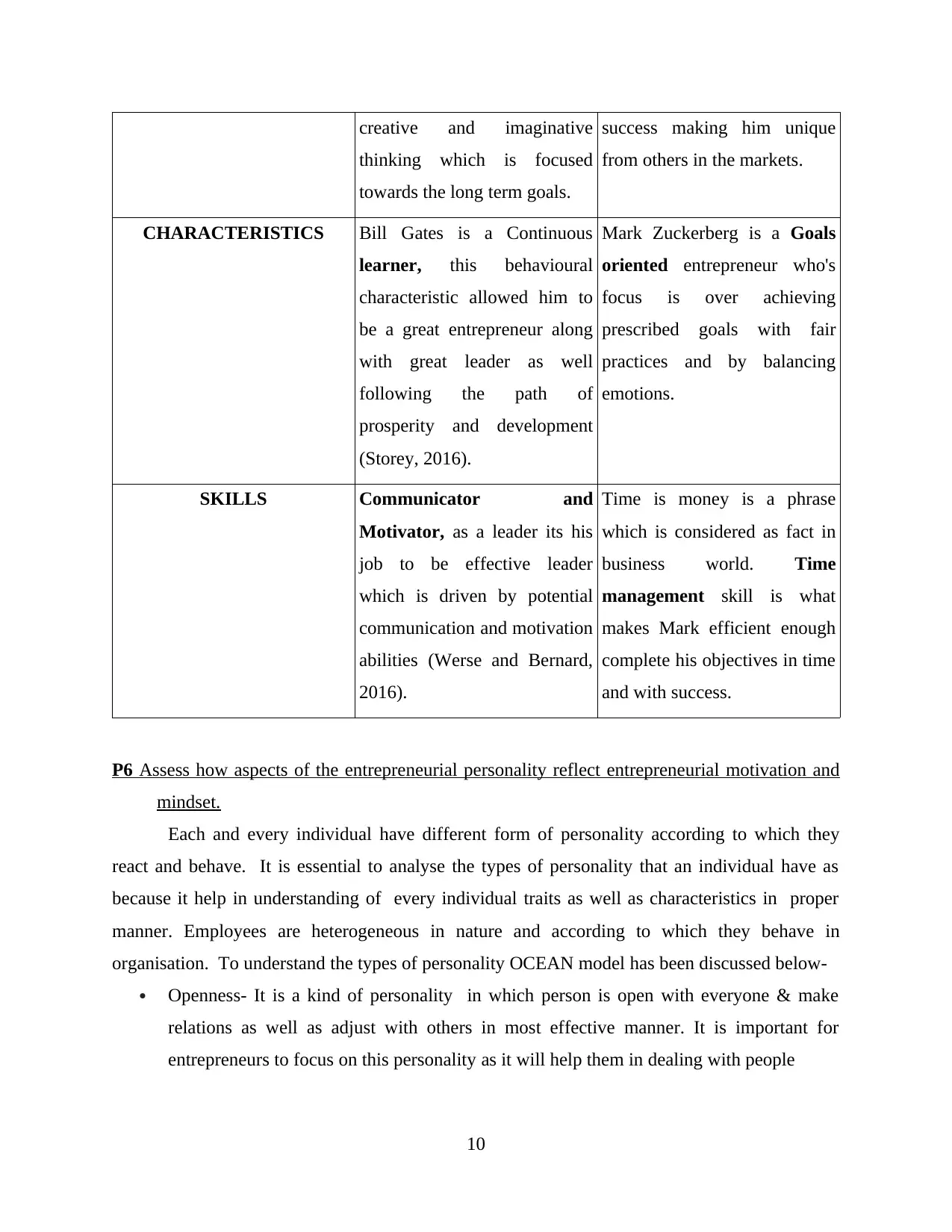
creative and imaginative
thinking which is focused
towards the long term goals.
success making him unique
from others in the markets.
CHARACTERISTICS Bill Gates is a Continuous
learner, this behavioural
characteristic allowed him to
be a great entrepreneur along
with great leader as well
following the path of
prosperity and development
(Storey, 2016).
Mark Zuckerberg is a Goals
oriented entrepreneur who's
focus is over achieving
prescribed goals with fair
practices and by balancing
emotions.
SKILLS Communicator and
Motivator, as a leader its his
job to be effective leader
which is driven by potential
communication and motivation
abilities (Werse and Bernard,
2016).
Time is money is a phrase
which is considered as fact in
business world. Time
management skill is what
makes Mark efficient enough
complete his objectives in time
and with success.
P6 Assess how aspects of the entrepreneurial personality reflect entrepreneurial motivation and
mindset.
Each and every individual have different form of personality according to which they
react and behave. It is essential to analyse the types of personality that an individual have as
because it help in understanding of every individual traits as well as characteristics in proper
manner. Employees are heterogeneous in nature and according to which they behave in
organisation. To understand the types of personality OCEAN model has been discussed below-
Openness- It is a kind of personality in which person is open with everyone & make
relations as well as adjust with others in most effective manner. It is important for
entrepreneurs to focus on this personality as it will help them in dealing with people
10
thinking which is focused
towards the long term goals.
success making him unique
from others in the markets.
CHARACTERISTICS Bill Gates is a Continuous
learner, this behavioural
characteristic allowed him to
be a great entrepreneur along
with great leader as well
following the path of
prosperity and development
(Storey, 2016).
Mark Zuckerberg is a Goals
oriented entrepreneur who's
focus is over achieving
prescribed goals with fair
practices and by balancing
emotions.
SKILLS Communicator and
Motivator, as a leader its his
job to be effective leader
which is driven by potential
communication and motivation
abilities (Werse and Bernard,
2016).
Time is money is a phrase
which is considered as fact in
business world. Time
management skill is what
makes Mark efficient enough
complete his objectives in time
and with success.
P6 Assess how aspects of the entrepreneurial personality reflect entrepreneurial motivation and
mindset.
Each and every individual have different form of personality according to which they
react and behave. It is essential to analyse the types of personality that an individual have as
because it help in understanding of every individual traits as well as characteristics in proper
manner. Employees are heterogeneous in nature and according to which they behave in
organisation. To understand the types of personality OCEAN model has been discussed below-
Openness- It is a kind of personality in which person is open with everyone & make
relations as well as adjust with others in most effective manner. It is important for
entrepreneurs to focus on this personality as it will help them in dealing with people
10
Paraphrase This Document
Need a fresh take? Get an instant paraphrase of this document with our AI Paraphraser
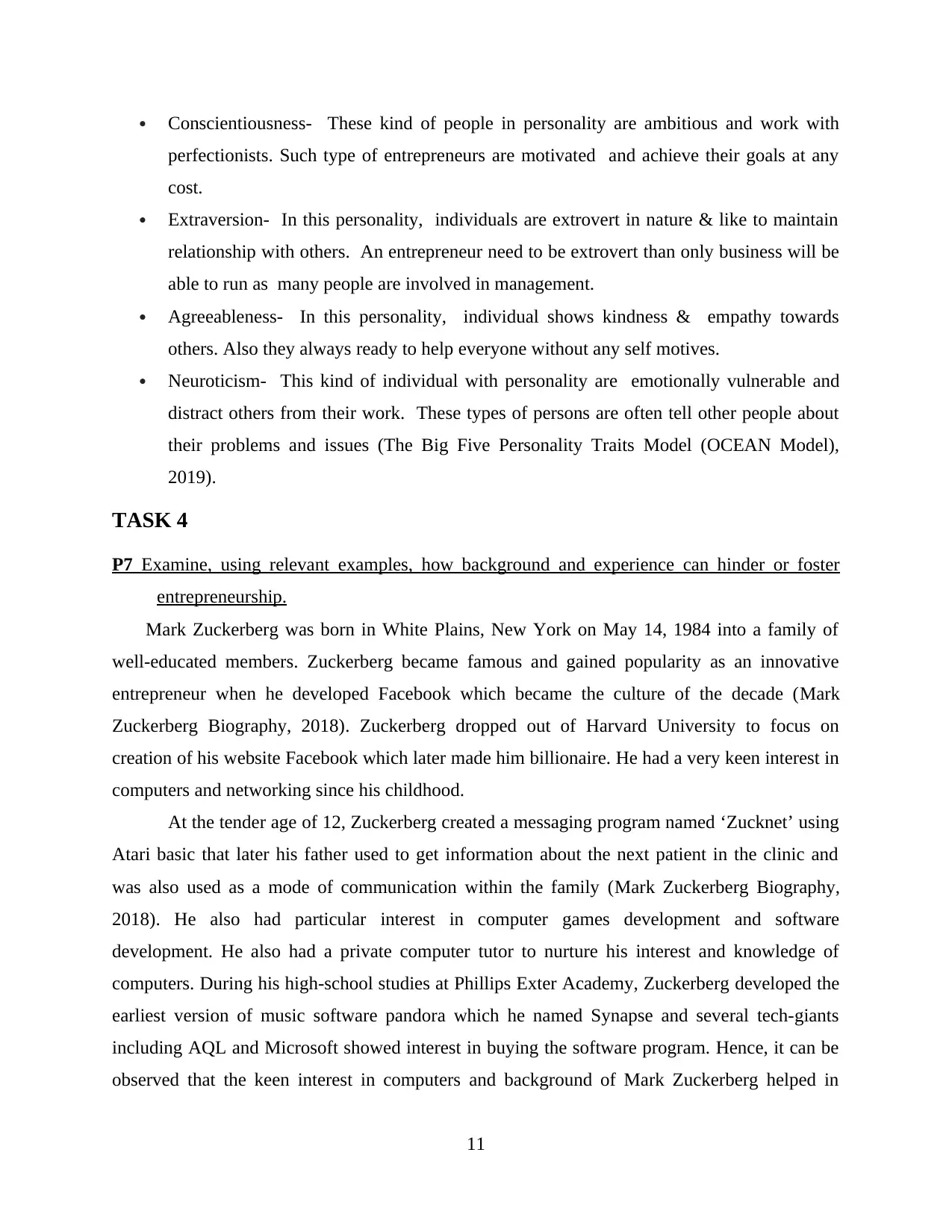
Conscientiousness- These kind of people in personality are ambitious and work with
perfectionists. Such type of entrepreneurs are motivated and achieve their goals at any
cost.
Extraversion- In this personality, individuals are extrovert in nature & like to maintain
relationship with others. An entrepreneur need to be extrovert than only business will be
able to run as many people are involved in management.
Agreeableness- In this personality, individual shows kindness & empathy towards
others. Also they always ready to help everyone without any self motives.
Neuroticism- This kind of individual with personality are emotionally vulnerable and
distract others from their work. These types of persons are often tell other people about
their problems and issues (The Big Five Personality Traits Model (OCEAN Model),
2019).
TASK 4
P7 Examine, using relevant examples, how background and experience can hinder or foster
entrepreneurship.
Mark Zuckerberg was born in White Plains, New York on May 14, 1984 into a family of
well-educated members. Zuckerberg became famous and gained popularity as an innovative
entrepreneur when he developed Facebook which became the culture of the decade (Mark
Zuckerberg Biography, 2018). Zuckerberg dropped out of Harvard University to focus on
creation of his website Facebook which later made him billionaire. He had a very keen interest in
computers and networking since his childhood.
At the tender age of 12, Zuckerberg created a messaging program named ‘Zucknet’ using
Atari basic that later his father used to get information about the next patient in the clinic and
was also used as a mode of communication within the family (Mark Zuckerberg Biography,
2018). He also had particular interest in computer games development and software
development. He also had a private computer tutor to nurture his interest and knowledge of
computers. During his high-school studies at Phillips Exter Academy, Zuckerberg developed the
earliest version of music software pandora which he named Synapse and several tech-giants
including AQL and Microsoft showed interest in buying the software program. Hence, it can be
observed that the keen interest in computers and background of Mark Zuckerberg helped in
11
perfectionists. Such type of entrepreneurs are motivated and achieve their goals at any
cost.
Extraversion- In this personality, individuals are extrovert in nature & like to maintain
relationship with others. An entrepreneur need to be extrovert than only business will be
able to run as many people are involved in management.
Agreeableness- In this personality, individual shows kindness & empathy towards
others. Also they always ready to help everyone without any self motives.
Neuroticism- This kind of individual with personality are emotionally vulnerable and
distract others from their work. These types of persons are often tell other people about
their problems and issues (The Big Five Personality Traits Model (OCEAN Model),
2019).
TASK 4
P7 Examine, using relevant examples, how background and experience can hinder or foster
entrepreneurship.
Mark Zuckerberg was born in White Plains, New York on May 14, 1984 into a family of
well-educated members. Zuckerberg became famous and gained popularity as an innovative
entrepreneur when he developed Facebook which became the culture of the decade (Mark
Zuckerberg Biography, 2018). Zuckerberg dropped out of Harvard University to focus on
creation of his website Facebook which later made him billionaire. He had a very keen interest in
computers and networking since his childhood.
At the tender age of 12, Zuckerberg created a messaging program named ‘Zucknet’ using
Atari basic that later his father used to get information about the next patient in the clinic and
was also used as a mode of communication within the family (Mark Zuckerberg Biography,
2018). He also had particular interest in computer games development and software
development. He also had a private computer tutor to nurture his interest and knowledge of
computers. During his high-school studies at Phillips Exter Academy, Zuckerberg developed the
earliest version of music software pandora which he named Synapse and several tech-giants
including AQL and Microsoft showed interest in buying the software program. Hence, it can be
observed that the keen interest in computers and background of Mark Zuckerberg helped in
11
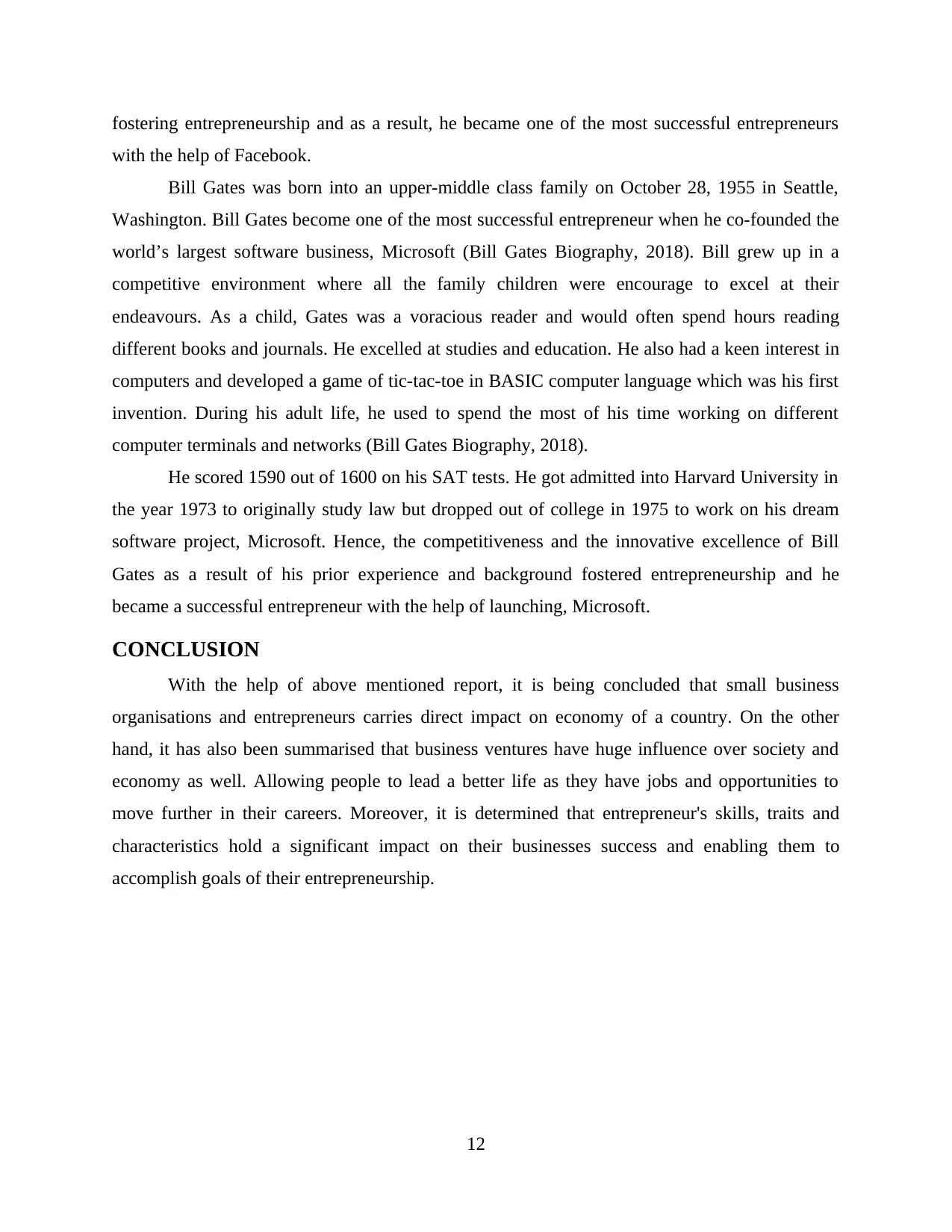
fostering entrepreneurship and as a result, he became one of the most successful entrepreneurs
with the help of Facebook.
Bill Gates was born into an upper-middle class family on October 28, 1955 in Seattle,
Washington. Bill Gates become one of the most successful entrepreneur when he co-founded the
world’s largest software business, Microsoft (Bill Gates Biography, 2018). Bill grew up in a
competitive environment where all the family children were encourage to excel at their
endeavours. As a child, Gates was a voracious reader and would often spend hours reading
different books and journals. He excelled at studies and education. He also had a keen interest in
computers and developed a game of tic-tac-toe in BASIC computer language which was his first
invention. During his adult life, he used to spend the most of his time working on different
computer terminals and networks (Bill Gates Biography, 2018).
He scored 1590 out of 1600 on his SAT tests. He got admitted into Harvard University in
the year 1973 to originally study law but dropped out of college in 1975 to work on his dream
software project, Microsoft. Hence, the competitiveness and the innovative excellence of Bill
Gates as a result of his prior experience and background fostered entrepreneurship and he
became a successful entrepreneur with the help of launching, Microsoft.
CONCLUSION
With the help of above mentioned report, it is being concluded that small business
organisations and entrepreneurs carries direct impact on economy of a country. On the other
hand, it has also been summarised that business ventures have huge influence over society and
economy as well. Allowing people to lead a better life as they have jobs and opportunities to
move further in their careers. Moreover, it is determined that entrepreneur's skills, traits and
characteristics hold a significant impact on their businesses success and enabling them to
accomplish goals of their entrepreneurship.
12
with the help of Facebook.
Bill Gates was born into an upper-middle class family on October 28, 1955 in Seattle,
Washington. Bill Gates become one of the most successful entrepreneur when he co-founded the
world’s largest software business, Microsoft (Bill Gates Biography, 2018). Bill grew up in a
competitive environment where all the family children were encourage to excel at their
endeavours. As a child, Gates was a voracious reader and would often spend hours reading
different books and journals. He excelled at studies and education. He also had a keen interest in
computers and developed a game of tic-tac-toe in BASIC computer language which was his first
invention. During his adult life, he used to spend the most of his time working on different
computer terminals and networks (Bill Gates Biography, 2018).
He scored 1590 out of 1600 on his SAT tests. He got admitted into Harvard University in
the year 1973 to originally study law but dropped out of college in 1975 to work on his dream
software project, Microsoft. Hence, the competitiveness and the innovative excellence of Bill
Gates as a result of his prior experience and background fostered entrepreneurship and he
became a successful entrepreneur with the help of launching, Microsoft.
CONCLUSION
With the help of above mentioned report, it is being concluded that small business
organisations and entrepreneurs carries direct impact on economy of a country. On the other
hand, it has also been summarised that business ventures have huge influence over society and
economy as well. Allowing people to lead a better life as they have jobs and opportunities to
move further in their careers. Moreover, it is determined that entrepreneur's skills, traits and
characteristics hold a significant impact on their businesses success and enabling them to
accomplish goals of their entrepreneurship.
12
⊘ This is a preview!⊘
Do you want full access?
Subscribe today to unlock all pages.

Trusted by 1+ million students worldwide
1 out of 13
Related Documents
Your All-in-One AI-Powered Toolkit for Academic Success.
+13062052269
info@desklib.com
Available 24*7 on WhatsApp / Email
![[object Object]](/_next/static/media/star-bottom.7253800d.svg)
Unlock your academic potential
Copyright © 2020–2026 A2Z Services. All Rights Reserved. Developed and managed by ZUCOL.




